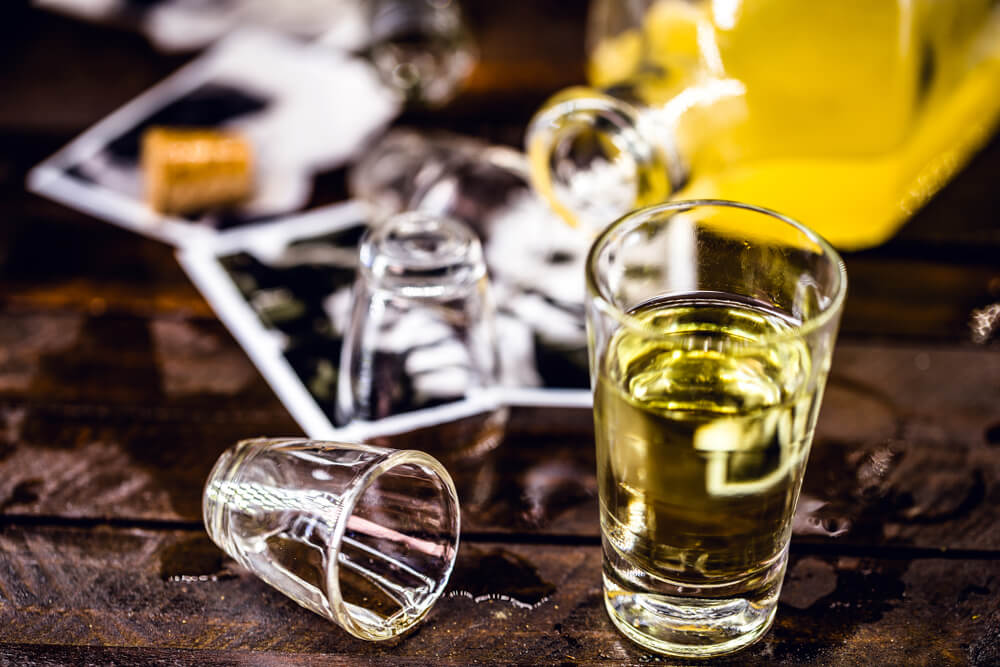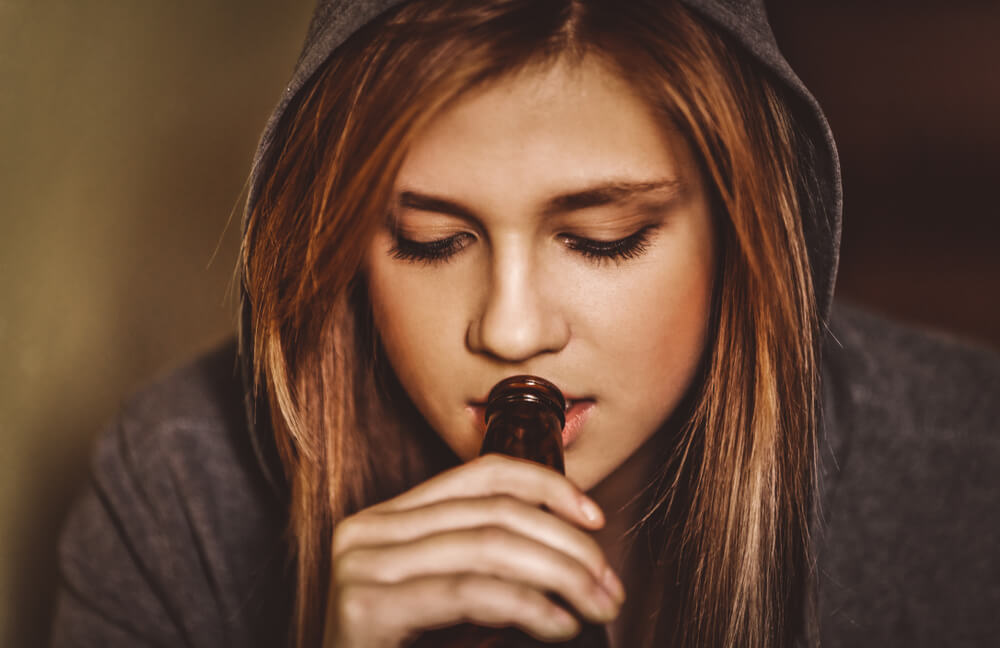
People around the world have consumed alcohol since the beginning of time. By 100 B.C., wine was consumed by most Romans to the tune of 250 liters or more than 66 gallons of wine per year. It was common for alcohol to be used as payment across many nations and it was even distributed to the poor for free. It has been included in religious celebrations for centuries and was an important part of Greek culture.
Learn more about our teen alcohol rehab or call us now at 888-254-0916.
Drinking has always been a part of many cultures around the world and is generally a personal choice whether to consume or not. For some adults, choosing to drink alcohol is about being social, having a “good” time and in many respects, is expected in social gatherings. Alcohol is created by the natural process of fermentation of grains, fruits, and vegetables. So, if it is so “natural”, why does it make some people do things that they would otherwise not do, lose their inhibitions, and even take risks?
Alcohol is a depressant, slowing the function of the central nervous system and blocking messages to the brain. People who consume large amounts of alcohol tend to lose or have diminished control of their perceptions, movement, vision, hearing, emotions, and rational thought. If you have ever consumed a large volume of alcohol, you most certainly know how this feels.
Now imagine a teenager, whose brain is not yet fully developed, yet chooses to drink alcohol. What impact could it have on their still developing, immature bodies and brains? In small amounts, it may make a teen feel relaxed or less anxious. However, even a small amount could have drastic effects. Research shows that alcohol in general can alter the development of a teen’s brain, potentially affecting brain function and even structure.
Because of the vulnerability of teens’ brains and the devastating impact drinking alcohol can have on their lives, 190 countries around the world have instituted a drinking age of at least 19 years old to curb drinking by minors. At this age, their brains are still developing but they are more likely to make a conscious decision about consuming alcohol or not as they become an adult. Of course, here in the U.S., the legal drinking age is 21 while in India, in some states, it can be as high as 25.
Knowing the risks of drinking alcohol, teenagers around the world still consume it. Unlike adults who may drink socially and regularly, most underage drinking is done in the form of binge drinking. According to the CDC, alcohol is the most commonly used and abused substance by teens and results in 4300 deaths each year by alcohol poisoning, car accidents, homicide, suicide, and other risky behaviors. As we all know, when a person is under the influence of alcohol their judgment is impaired which may cause them to engage in activities that they would normally view as unsafe or harmful.
A recent study reveals that 11% of the alcohol consumed in the United States is drunk by young people between the ages of 12 and 20. As young as this may seem and most parents are probably in denial that a child that young may consider drinking alcohol, the average age when a teen first takes a drink is 14.
This may be shocking that a child that young would even consider alcohol as an option and that is a reasonable thought. However, there are many reasons why teenagers drink alcohol.
Why Teens Drink
During this very vulnerable and impressionable time, teens are most susceptible to the pressures from peers and the world around them. From a young age, they are surrounded by advertising displaying beautiful people, having fun, hanging with friends, enjoying the “good life”. Of course, as they strive to fit in with peers, they believe that fitting in also includes doing what everyone else is doing or what they think is “cool”.
Sarah was a sophomore in high school and desperately wanted to be included with the “in” crowd. When she received an invitation to a graduation party hosted by a senior, she was thrilled, knowing that this was her big chance to get into the mix. She took this as her opportunity to show the upperclassmen that she is likable and deserving of fitting into the crowd. Nervous about how others view her, Sarah made sure that she did everything right; perfect hair, perfect makeup, cute little dress. Little did she know that going to this party not only meant that she would be accepted but also that she would be expected to follow the crowd – even if this meant drinking alcohol. In her desperation to be liked, not only did this 16-year-old try alcohol for the first time, but she tried to impress the other teens by consuming it in excess. Her decision and desire to fit in landed her in the emergency room where they had to pump her stomach due to alcohol poisoning.
Teens feel pressured to follow the crowd for them to be liked and accepted. Whether the peer pressure is overt or simply implied, by nature of wanting to fit in, some teens are willing to take certain risks to guarantee their place in the social lineup. As adults, we know that life does not have any guarantees but our brains are developed enough to understand the risks associated with our choices. Unfortunately for Sarah, peer pressure and her own desires consumed and overwhelmed her rational thought.
In Sarah’s case, she knew the risks associated with underage drinking. Her parents had spoken to her about the effects that alcohol has on the body and the brain and the risks that she would be taking if she decided to drink. Peer pressure for a teen can be unfortunately more powerful than what they have been taught or even their own instincts.
Although they may be fully aware of the impact and risks of alcohol, some teens may be drawn to try it simply out of curiosity. They may have seen you and other adults drinking socially wondering what the appeal is. They see how adults behave, maybe becoming more relaxed or giddy, and they want to experience that same ‘feel-good’ feeling. If drinking alcohol generally gives people that warm and fuzzy feeling, why wouldn’t they want to try it too?
Teens are in a very precarious position – they are no longer children but not yet adults. They want to appear older yet their brains are not yet prepared for the decision-making and responsibilities of being an adult like deciding to drink. The hormones racing through their bodies tell them that they are physically capable of handling the effects of alcohol while their brains are not yet developed enough to process the possible effects.
Lastly, teens believe that drinking alcohol can be an escape from their problems, thoughts, and fears. As they watch adults or other teens slip into a state of euphoria in which all of their problems appear to disappear, they look longingly at how they too could find relief from their struggles. They might think that even if a temporary fix, alcohol could take them away from their emotional stress, the pressures of school/home, and their pain and anguish. What they do not realize is that alcohol consumption can only lead to more problems for a teen. They do not understand both the long-term and short-term detriment that alcohol has on their bodies and minds. For many teens, thinking about the future is not only difficult but brings on more anxiety and frustration.
They find themselves stuck in a revolving door of wanting to find a solution or temporary relief from their life so to speak while creating more challenges for themselves. For teens who consume alcohol as an escape, it may simply be a symptom of something else that is going on in their mind or life. For example, if you notice other behavioral signs in your teen such as mood changes, a noticeable decrease in energy, less concern for hygiene or appearance, and a sudden lack of interest in things that they once loved, their alcohol use may be a symptom of a mental health disorder such as depression or anxiety.
If you suspect that your teen is drinking alcohol or that they may be faced with a mental health issue, you must reach out to their pediatrician for an evaluation and further assistance. Alcohol consumption by teens can cause irreparable damage including high blood pressure, stroke and cardiovascular issues, neurological damage, pancreatitis, cancer, seizures, anemia, depression, and of course, brain damage. According to the Journal of Neuroscience, a teen’s drinking can even lead to cognitive impairment since their brains are not yet fully developed.
Before your teen is faced with these additional challenges and to identify if there is an underlying reason other than peer pressure or curiosity for their drinking, contact a trained professional at XXX Treatment Center. After a referral from your teen’s pediatrician, the mental health professionals will help to properly diagnose your teen’s mental health disorder as well as develop a treatment plan to address this issue as well as their resulting behavior of drinking alcohol.

Your teen’s life and future are too valuable for them to throw it away by drinking alcohol at a young age. You may say “we all did it” but just because you did when you were young does not mean that it is necessarily the right thing for your teen especially if the driving force is something deeper.
As a parent, it is your responsibility to communicate the dangers of drinking alcohol with your teen and even some of the repercussions of their actions. Discuss that drinking under the age of 21 is illegal and punishable by law. Alcohol consumption may impact their ability to engage at school, their ability to process what they learn, and may impact their coordination for sports. Explain to your teen the health risks associated with drinking alcohol for both the short-term and long-term and share how their body reacts when it is inebriated. It is also very important to discuss how alcohol can encourage them to engage in risky behaviors or put them in dangerous positions because their brain function is impaired.
Although it is illegal and teens understand the risks, some teens are still going to try alcohol for the first time. Even the teen who you least suspect to be the one to try it may do so out of curiosity or peer pressure. Be certain to monitor your teen for any signs of intoxication as well as if their behavior and moods change, indicating that their alcohol consumption is a symptom of an even more challenging mental health disorder.




